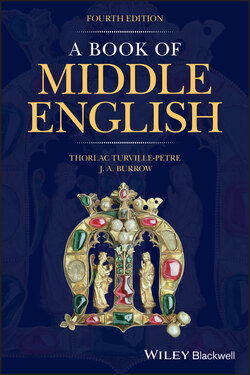Читать книгу A Book of Middle English - J. A. Burrow - Страница 33
4.2.6 Mutated Plurals
ОглавлениеMany of the Old English mutated plurals (with change of stem vowel) survive, as indeed they do in Modern English. In The Owl and the Nightingale the following forms are found for man:
| sg. | nom./acc. | mon, man |
| gen. | monnes | |
| dat. | men, manne | |
| pl. | nom./acc. | men |
| gen. | monne | |
| dat. | monne, manne, men |
Here the mutated form men may be dative singular as well as plural. This survival of the Old English pattern is exceptional, and other texts have the mutated form only in the plural. The genitive plural is elsewhere usually men(ne)s, but note men hacches, ‘men’s kitchen‐doors’, 7a/29, and bondemen barnes, ‘villeins’ children’, 7a/70.
Other nouns of this type are:
| singular | plural |
| fot, ‘foot’ | fet |
| gos, ‘goose’ | ges |
| mous, ‘mouse’ | mys (mus 2/87) |
| toþ, ‘tooth’ | teþ |
Broþer had the plural breþer, 9/39, but in the South an additional ‐en plural was often added, as in bretherne, 7b/217, whence Modern English ‘brethren’.
